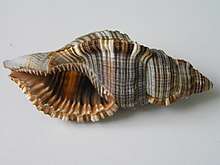Monoplex pilearis
Monoplex pilearis, common name the hairy triton, is a species of medium-sized predatory sea snail, a marine gastropod mollusk in the family Cymatiidae.[1]
| Monoplex pilearis | |
|---|---|
| A shell of Monoplex pilearis (Linnaeus, 1758) | |
| Scientific classification | |
| Kingdom: | Animalia |
| Phylum: | Mollusca |
| Class: | Gastropoda |
| Clade: | Caenogastropoda |
| Clade: | Hypsogastropoda |
| Order: | Littorinimorpha |
| Family: | Cymatiidae |
| Genus: | Monoplex |
| Species: | M. pilearis |
| Binomial name | |
| Monoplex pilearis (Linnaeus, 1758) | |
| Synonyms[1] | |
| |
Distribution
This species is widespread in the Atlantic, in the Red Sea and in the Indo-Western Pacific from East and South Africa, to eastern Polynesia, north to southern Japan and Hawaii and south to southern Queensland.[2][3][4][5]
Habitat
This tropical benthic sea snails can be found at a depth range of 0 – 50 m.[4] They mainly live on hard and coarse detritic bottoms, in coral reef areas.[5]
Description
Shells of Monoplex pilearis can reach a size of 38–140 millimetres (1.5–5.5 in).[2] These large shells are elongate with a tall spire and a strongly inflated body whorl. They show a yellowish-brown surface with chestnut- brown spiral ribs. The columella and the aperture are dark brown with white teeth.[6] The outer sculpture is relatively fine, with long inner ridges of the outer lip, extending deep into the aperture.[5]
Biology
These sea snails are active predators. They are reported as feeding on bivalves. Eggs are laid on the substrate in large capsules clustered in masses.[5]

References
- Monoplex pilearis (Linnaeus, 1758). Retrieved through: World Register of Marine Species on 5 December 2018.
- Hardy's Internet Guide to Marine Gastropods
- Galli C.: WMSDB - Worldwide Mollusc Species Data Base
- Sea Life Base
- Cymatium pileare at FAO.org
- Angeline Myra Keen Sea Shells of Tropical West America: Marine Mollusks from Baja California to Peru
- Beu, A. (2010). Catalogue of Tonnoidea
| Wikimedia Commons has media related to Monoplex pilearis. |